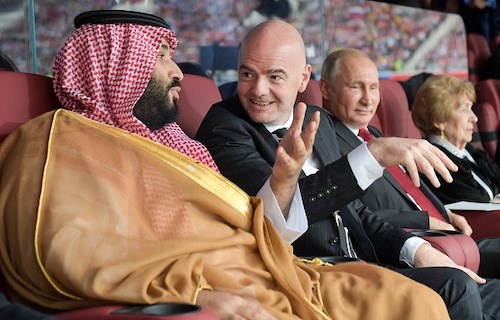Comment
The work of improving sports governance has just begun

Many topics deserve further research, such as how the democratic values in sport can be secured in the face of increased sports engagement from authoritarian states. Photo: Alexei Druzhinin/Getty Images
26.11.2021
It is indisputable that the start of the 2010’s became a turning point in the debate on sports governance. The taboos regarding the multiple threats to sports integrity were broken one by one, and the growing awareness led to global calls for better governance in sport.
Today, as all transnational institutions and the entire Olympic movement join the chorus praising good governance in sport, academics may be tempted to sing “mission completed” and turn the sheet of music to play other tunes.
That would be a fatal mistake. The public discourse has changed dramatically, but the realities of sport lack behind. Almost every week brings new evidence about corruption and flawed management in national and international sports federations. The work of improving sports governance has just begun.
At Play the Game, we take pride in having been at the forefront of the sports governance debate through our communication and conference activities, and through our partnerships with researchers worldwide – including the editors of this book and some of the authors - that led to the creation of the Sports Governance Observer tools.
Fortunately, the increased academic engagement stretches far beyond our own circles. This book testifies to that fact, and it only represents a fraction of what academics have produced in recent years.
As an outsider to the academic world allow me nevertheless to ask if the academic energy is always used in the best interest of sport and society.
Although I do understand that developing theories is a necessary and attractive endeavour, it would be helpful if academics raised their interest in events on the ground. Investigative journalism is poorly resourced, public prosecutors, too – and although I do not regard universities as lands of milk and honey, I think academics could add much clout by joining an alliance of under-financed researchers.
Many areas linked to sports governance are desperately in need of stronger empirical knowledge and creative theoretical thinking, just to mention a few:
- Models for reconstructing the autonomy of sport, balancing the fundamental freedom of association with the need to regulate the sports industry and protect it from criminal infiltration
- Ways to secure the democratic values sport can and should embody in the face of increased engagement from authoritarian states in ownerships and major events
- Surveys and facts to replace mythology in explaining what motivates people of all ages to engage in physical activity and sport
- Best practices for preventing psychological and sexual abuse at local and national level
- Research to make investment in sports facilities and societal infrastructure movement-friendly and efficient
- Strategies to ensure more sustainable and climate friendly sport from the consumer level to the organisation of mega-events
An obligation to help
Over the years I have heard even brilliant academics explain how they could only criticise sport for its failures and not contribute to finding solutions. This was beyond their responsibility and would also compromise their objectivity.
I could not disagree more. Academics are, in my view, just as much a part of humanity as the rest of us, and as human beings I think we are bound by an overall obligation to help each other and support our communities to the best of our abilities.
Besides, most academics are also dependent on public grants, and just as we demand that sports organisations take societal responsibility by arguing that they are supported by taxpayers, we can ask academic researchers to work for the public good.
Having said that, it is not possible to engage with stakeholders in the turbulent, conflict-ridden, and sometimes infectious world of sport without facing ethical dilemmas and threats to scientific integrity.
To avoid compromising their credibility, researchers must show full and frequent transparency about their methodologies, their findings, and their financial backing. And they must insist that this transparency is part of the contractual relations with third parties.
Any attempts to disguise the fundamental conditions of the research will weaken its impact and may even be counterproductive and nurture conspiracies.
The value of networking
For Play the Game, it has been of tremendous benefit to be able to cooperate with researchers from the very start of our activities in 1997. We have also watched how informal networks between researchers, journalists, whistle-blowers, sports leaders, athletes, and other stakeholders rise at our conferences with long-term value for those involved.
Studying the governance of sport may lead to academic excellence, but neither the one nor the other are ends in themselves. But academic excellence placed in a policy-oriented context can help us towards better governance in sport.
Good governance in sport will not solve all the problems I have mentioned. But without good governance, none of the problems will be solved.
Jens Sejer Andersen is a journalist, founder, and international director of Play the Game.
Download the free book on sports governance
Download “Good Governance in Sport. Critical Reflections” (ed. A. Geeraert and F.v. Eekeren), Routledge 2021.





